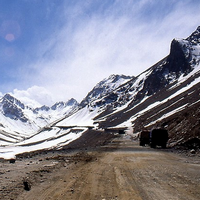BAGRAM, Afghanistan -- Gov. Abdul Basir Salangi grew worried as the snow fell heavily in Afghanistan's Parwan province on Feb. 8. Every day, some 14,000 cars, trucks and buses pass through Parwan's Salang Pass -- a system of winding roads and tunnels cutting through and over the Hindu Kush Mountains into northern Afghanistan. The snow could strand motorists, or even trap them in tunnels. In 1982, hundreds of people died when Soviet military convoys collided inside one of the tunnels. Vehicles idling behind the accident site filled the tunnel with carbon monoxide, suffocating the people inside.
Salangi grabbed some security guards and a videographer and headed into the pass, where Afghan police were already hard at work, stopping drivers and telling them to turn back. As the governor's party moved upslope, Salangi's video shows the snow falling faster and thicker, until suddenly a powerful wind drives the snow nearly horizontally.
The storm triggered dozens of avalanches across the pass, burying or stranding hundreds of cars and killing nearly 200 people that Salangi and other Afghan authorities had not reached in time. In an instant, Salangi's disaster-prevention efforts turned into disaster response. The Afghan government's "before" and "after" performances in the Salang disaster reveal both the strengths and weaknesses of a government that has struggled to gain legitimacy and capacity amid a foreign occupation and a tenacious insurgency.

